Best 20 AI Development Companies in Germany (2026 Updated)

Are you searching for an AI development company in Germany? But how can you be confident you’ll get a production-grade AI solution that meets GDPR standards without exceeding your budget? Many businesses are facing the same dilemma.
Roughly one in five German firms already use AI solutions, yet only a quarter feel prepared for the coming EU AI Act. 73% say that GDPR requirements slow them down, while 72% of those not yet using AI cite a lack of in-house expertise as the main barrier. That gap between enthusiasm and practical hurdles steers businesses toward reliable AI development companies in Germany partners that can deliver well-engineered systems and expertly navigate regulations as well.
German AI development companies bridge that gap with production-ready code and hands-on experience inside Europe’s toughest data-protection zone.
Today, the healthcare, automotive, finance, manufacturing, and every other sector in Germany utilizes machine learning, NLP applications, and automation to reduce costs and drive growth.
As artificial intelligence continues to transform industries, Germany has become one of Europe’s most trusted grounds for production-grade AI development, blending technical talent with industry expertise.
Let’s take a closer look.
-
$25-$49/hr
-
2013
-
Germany
-
250+
AI Development Services
-
$100 - $149 / hr
-
2019
-
Darmstadt , Germany
-
50 - 249
AI Development services
List of Top 10 AI Developers In Germany
As per Tracxn, there are more than 448 companies in the artificial intelligence sector in Germany. Identifying a partner that matches your technical needs, industry focus, and budget can thus feel daunting. We’ve narrowed the field to leading AI development companies in Germany—firms with consistent delivery records, enthusiastic client feedback, and true industry know-how.
The following table offers a broad overview:
| Company | Founded | Key Services |
|---|---|---|
| The NineHertz | 2013 | Custom AI/ML software, data analytics, GenAI integration, end-to-end product development |
| AI Superior | 2019 | End-to-end AI application development (LLMs, computer vision, analytics), AI strategy, MLOps |
| Dida | 2018 | Tailored ML solutions, natural language processing, computer vision, MLOps workflows |
| Qimia | 2015 | chatbot interfaces, on-premises generative AI services |
| theBlue.ai | 2017 | Generative AI agents, 3D movement analytics, AI avatars |
| DeepMetis | 2020 | Bespoke AI/ML engines, data-platform engineering, process automation, research partnerships |
| DialogData | 1992 | AI-enhanced SAP Commerce Cloud, chat-based product discovery, and personalization features |
| Dataslab | 2021 | Full-stack big data platforms, ML model deployment, data processing, and analytics |
| Aliz | 2009 | AI development, generative AI consulting, BI & Big Data integration, cloud-native solutions |
| Evinent | 2010 | Custom software development, legacy system modernization, AI/ML integration services |
The Best 20 AI Development Companies in Germany
Explore the profiles below—each of these leading AI developers in Germany can adapt their expertise to your project’s unique challenges.
1. The NineHertz: Best AI Development Company Germany
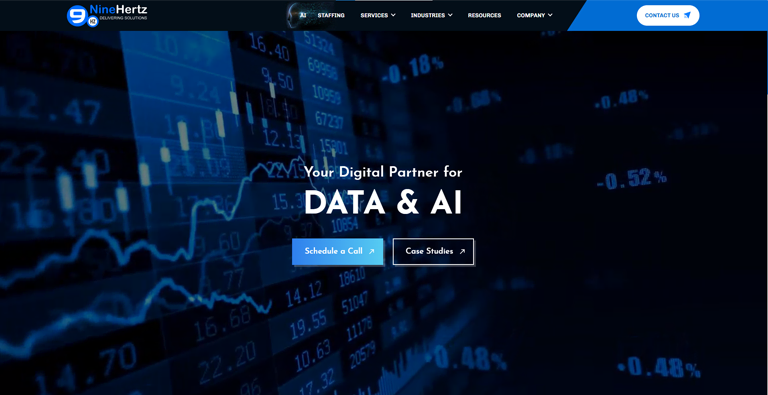
- Minimum Project Size: $25,000+
- Average Hourly Rate: $50 – $99
- Team Size: 350+
- Location: Serves Germany
- Website: https://theninehertz.com
The NineHertz is an AI development company in Germany that couples machine-learning know-how with disciplined, sprint-based delivery. A recent logistics engagement layered predictive fleet analytics and dynamic routing into an existing supply chain stack. By crunching years of route, traffic, and fuel data, the system now predicts demand, chooses the most cost-effective route for every truck, and flags maintenance early—cutting overall logistics costs by about 25%.
In retail, it created an NLP-driven chatbot that instantly answers questions, recommends items, and completes orders, achieving an 85% first-contact resolution rate.
Case files quantify ROI. They back every claim with real numbers and tie each model to clear bottom-line wins. The NineHertz is thus a grounded, get-it-done partner when you need dependable AI that runs in production.
2. AI Superior
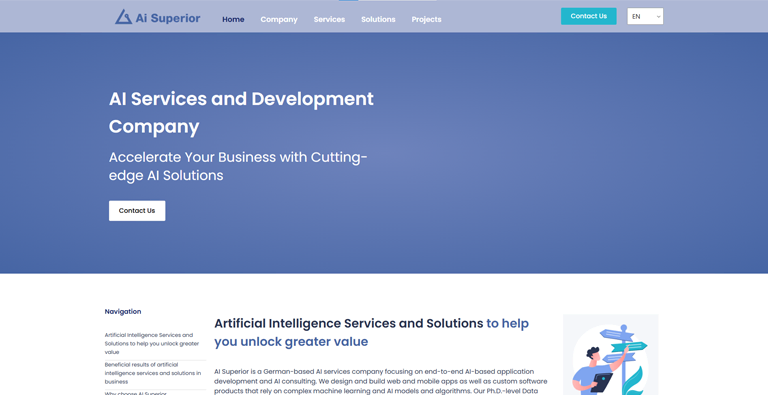
- Minimum Project Size: $25,000+
- Average Hourly Rate: $100 – $149
- Team Size: 10-49
- Location: Darmstadt
- Website: https://aisuperior.com
AI Superior’s PhD-led crew takes AI projects from concept all the way to launch. When a top publisher needed fresh, personalized content, they built LLM tools that generate custom stories and illustrations for each young reader, and four of those five prototypes went straight into live use. That knack for turning experiments into real, production-ready solutions earned the company the Clutch Global Award in Fall 2024.
3. dida
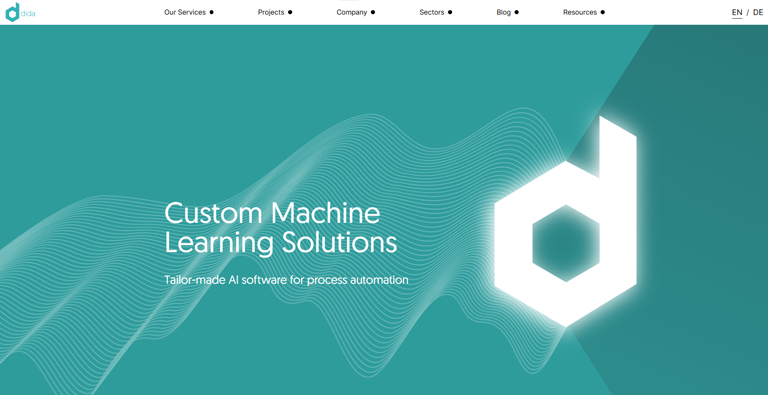
- Minimum Project Size: $25,000+
- Average Hourly Rate: $150 – $199
- Team Size: 10-49
- Location: Berlin
- Website: https://dida.do
Dida specializes in developing customized machine learning software. For German public archives, they turned countless documents into a searchable library with semantic search. Their computer vision system flags defects in real time. Organizations like Deutscher Wetterdienst and the European Space Agency rely on their tools to automate complex decision workflows. That practical focus earned this company Microsoft’s AI Award in 2020.
4. Qimia GmbH
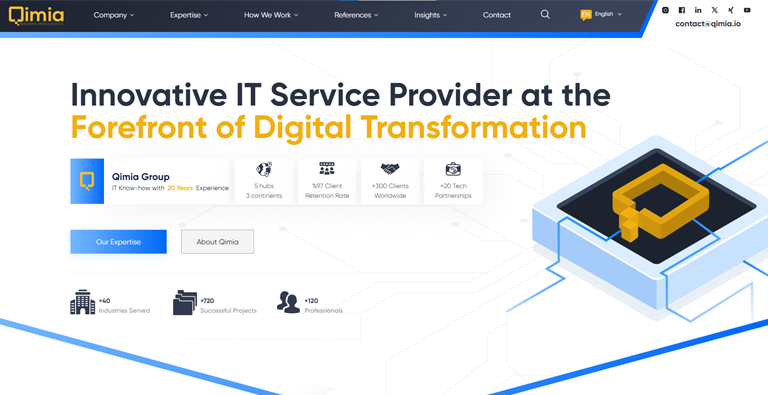
- Minimum Project Size: $10,000+
- Average Hourly Rate: $50 – $99
- Team Size: 120+
- Location: Köln
- Website: https://qimia.io
QimiaAI gives you a private LLM environment with semantic indexing and a chat-style front end that runs fully on-prem. One recent deployment, a multi-terabyte document assistant for a European finance group, shows how the platform can tame giant unstructured archives without moving sensitive files off-site. Building on AWS, Azure, and Google Cloud services, this team can align the stack with whatever ERP your enterprise already follows.
5. TheBlue.ai
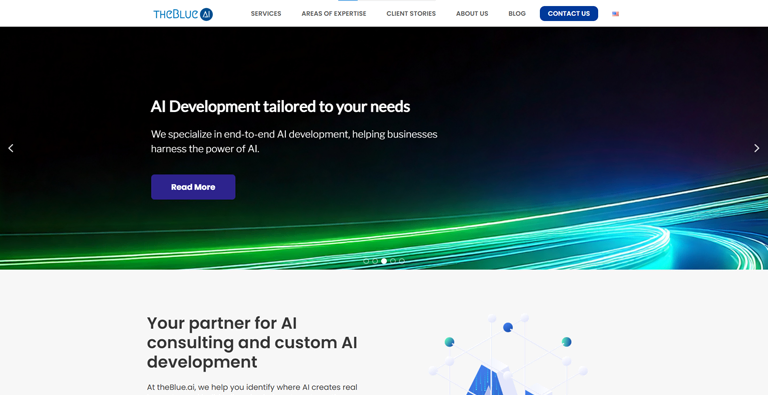
- Minimum Project Size: $5,000+
- Average Hourly Rate: $50 – $99
- Team Size: 10-49
- Location: Hamburg
- Website: https://theblue.ai
Backed by technical alliances with Microsoft, AWS, and NVIDIA, theBlue.ai guides clients from early use-case scoping through to live model operations. Their recent work includes a generative-AI assistant for apoQlar that lets medical staff retrieve documents through natural-language queries and a 3-D movement-recognition system for advanced manufacturing. Long-term clients include brands like Arvato, BMW, and Novartis.
6. DeepMetis
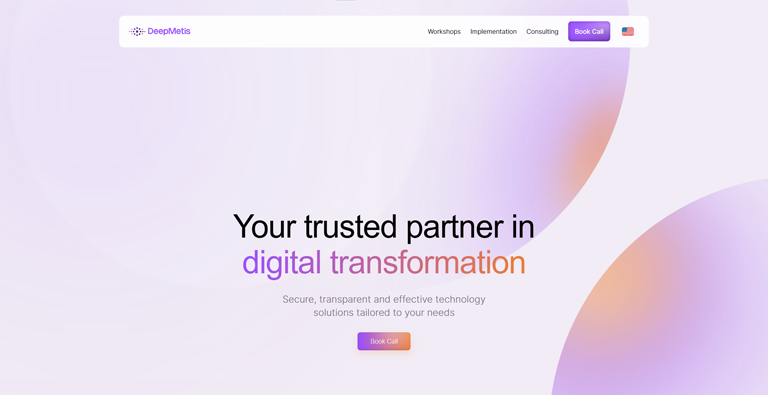
- Minimum Project Size: $25,000+
- Average Hourly Rate: $50 – $99
- Team Size: 2-9
- Location: Berlin
- Website: https://deepmetis.com
DeepMetis delivers process automation and custom LLMs. They replaced manual contract review with GPT–4–based extraction, cutting turnaround time by 60%. Their research group has been unfolding neural networks step by step to show doctors precisely which words and images shaped each diagnosis. The company invites engineers to dive into its GitHub repositories so that everyone can see how models are trained.
7. DialogData
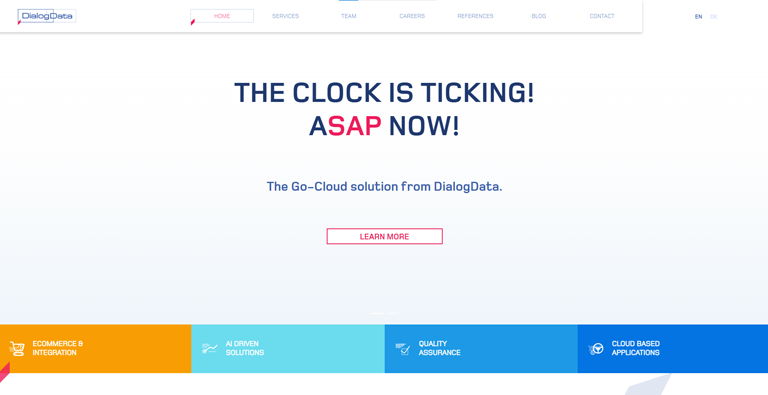
- Minimum Project Size: $5,000+
- Average Hourly Rate: $50 – $99
- Team Size: 50-249
- Location: München
- Website: https://www.dialogdata.de
DialogData delivers AI-driven solutions powered by GPT, Google, Meta, and SAP AI to improve SAP Commerce Cloud implementations. Their AI-based features empower clients across commerce, automotive, Industry 4.0, financial, and energy sectors. With 105+ ecommerce builds, DialogData recently added chat-based product discovery powered by its in-house AI practice, earning mention in AI Superior’s “noteworthy chatbot developers” list.
8. Dataslab
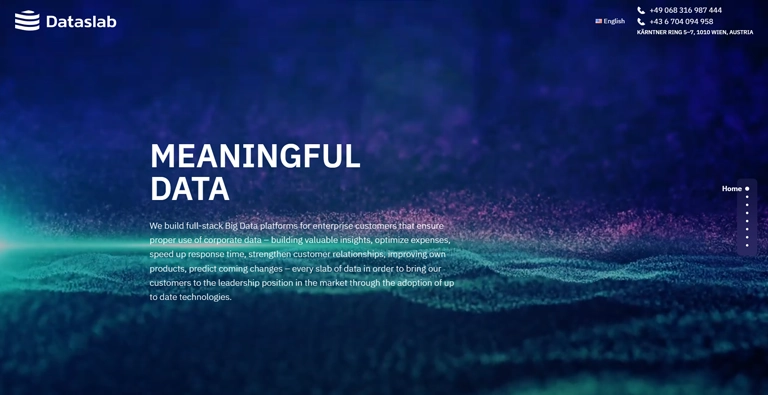
- Minimum Project Size: $50,000+
- Average Hourly Rate: $50 – $99
- Team Size: 10-49
- Location: Saarlouis
- Website: https://dataslab.eu
Dataslab builds full-stack big data platforms and crafts machine-learning models for complex business needs. They’ve engineered enterprise data platforms that take in and analyze millions of IoT events, optimizing expenses and predicting operational shifts for telecom and energy companies. Trusted in financial, media, and government sectors, their solutions strengthen customer relationships and speed up response times by turning every slab of data into market-leading insights.
9. Aliz
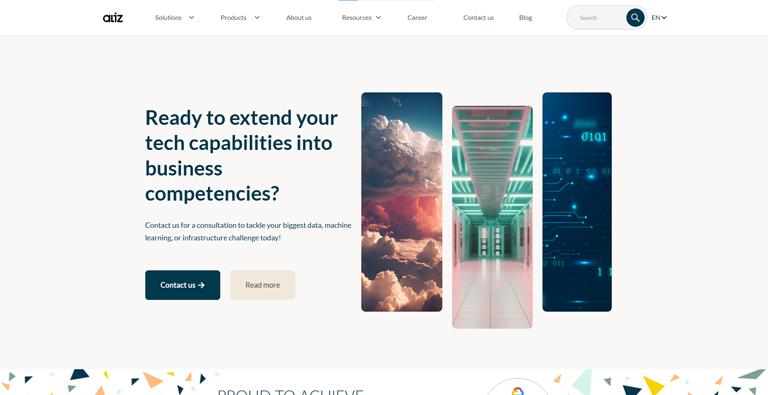
- Minimum Project Size: $50,000+
- Average Hourly Rate: $50 – $99
- Team Size: 50-249
- Location: Berlin
- Website: https://www.aliz.ai
A Google Cloud Partner of the Year (2023), Aliz achieved Generative AI Specialization. Its GenAI assistant, Rabbit, sends real-time Google Cloud billing insights to Slack and Google Chat, giving immediate clarity on cloud spending. In a notable engagement with OTTO, Aliz rebuilt the retailer’s multi-cloud foundation and embedded AI-driven logistics analytics—proof of how they weave generative AI into cloud platforms for finance, retail, and manufacturing clients alike.
10. Evinent GmbH
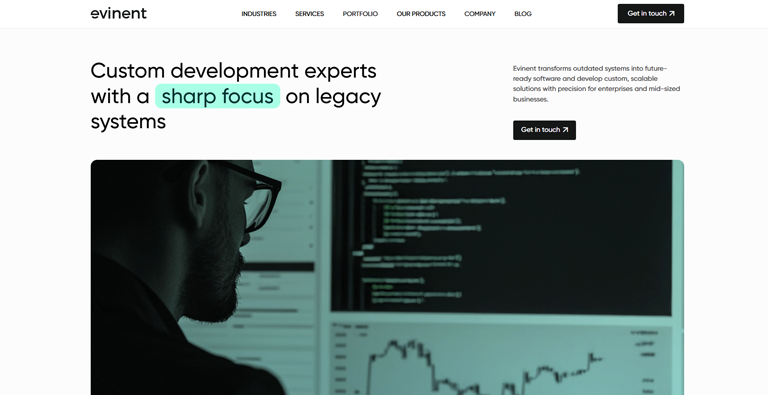
- Minimum Project Size: $10,000+
- Average Hourly Rate: $25 – $49
- Team Size: 10-49
- Location: Grasbrunn, Germany
- Website: https://evinent.com
Evinent crafts AI chatbots and powers analytics platforms. For Foxtrot, they redesigned search so that users found what they wanted faster—doubling query volume and lifting conversions by 40 percent. They replaced a leading US healthcare tech provider’s outdated data stack with a secure, scalable platform having end-to-end encryption and live data synchronization. Thus, they kept critical information protected as well as immediately available.
11. emjul GmbH
- Minimum Project Size: $1,000+
- Average Hourly Rate: $100 – $149
- Team Size: 2-9
- Location: Berlin
- Website: https://emjul.de
emjul GmbH crafts intelligent digital products by weaving AI into fintech and real estate platforms. Their API-first automation speeds up workflows and also removes every extra click so that users move through tasks almost effortlessly. Clients say that their developers feel like an extension of their own team, working shoulder to shoulder until every process hums. The company’s perfect 5.0 Clutch rating for overall performance is a testament to their consistent delivery and client satisfaction.
12. iworxs by Palnar
- Minimum Project Size: $5,000+
- Average Hourly Rate: < $25
- Team Size: 50-249
- Location: Massenbachhausen
- Website: https://iworxs.de
iWorxs by Palnar creates bespoke, production-grade computer-vision systems and data-analytics solutions that detect real-time anomalies on manufacturing lines. A recent work shows how a combination of YOLO, PoseNet, and LSTM is used to spot performance issues, which helps lower the number of defects in client testing equipment. The company’s SAP-focused portfolio underscores seamless cross-domain integration, reinforcing trust among automotive and pharmaceutical partners.
13. DataArt
- Minimum Project Size: $100,000+
- Average Hourly Rate: $50 – $99
- Team Size: 5,000+
- Location: Munich
- Website: https://www.dataart.com/
DataArt’s data scientists, cloud architects, and software engineers excel at automating the tedious manual tasks that bog down banks, hospitals, and software vendors—freeing their teams to focus on strategic, high-value work. One standout job: rebuilding food-delivery giant Rappi’s Elasticsearch stack, which pushed checkout drop-offs down from 25% to 5% in two development sprints. “DataArt moved faster than any in-house team we’ve tried,” their client Rappi said.
14. ELEKS
- Minimum Project Size: $25,000+
- Average Hourly Rate: $50–$99
- Team Size: 2,000+
- Location: Berlin
- Website: https://eleks.com
ELEKS’s data scientists, machine-learning engineers, and AI strategists are dedicated to transforming complex data into production-ready solutions. They’ve rolled out AI solutions across banking, healthcare diagnostics, logistics operations, and automotive production. For Microsoft, they built an AI-powered knowledge management system—layering the Copilot Agent onto Teams and Atlassian tools—to categorize support tickets and cut root-cause analysis time by 20%.
15. LOLML GmbH
- Minimum Project Size: $10,000+
- Average Hourly Rate: $150 – $199
- Team Size: 2-9
- Location: München
- Website: https://lolml.com/
LOLML GmbH is a boutique AI & data science lab that builds AI and data science tools to tackle hassles that enterprises face every day. They’ve put together a service that feeds data into critical workflows without manual hand-offs. On their website, you’ll find open-source MLOps templates designed to get projects off the ground in a few clicks. In one standout engagement, they swapped a client’s old EDI converter for an AI-driven system that pulls mapping rules straight from live data—dropping mapping costs by 30 to 70%.
16. *instinctools
- Minimum Project Size: $10,000+
- Average Hourly Rate: $25 – $49
- Team Size: 250 – 999
- Location: Stuttgart
- Website: https://www.instinctools.com
*instinctools focuses on AI solutions to deal with day-to-day problems clients face at work. In one project, they trained a model to read CAD files and generate the first draft of engineering specifications—slashing hours off the prep work. For a SaaS provider, they boosted customer retention by driving low churn rates while delivering on time and budget. Clutch recognized their results by naming them a Top Computer Vision Company in 2024.
17. Hivemind Technologies
- Minimum Project Size: $10,000+
- Average Hourly Rate: $150 – $199
- Team Size: 10-49
- Location: Berlin
- Website: https://hivemindtechnologies.com
Hivemind Technologies trains models right where the information lives with federated learning and locks down exchanges between collaborators using secure multi-party computation. They launched an LLM-based multi-agent framework that empowers AI agents to assist in software specification, agile modeling, and automated requirement derivation alongside human developers. Thus, they enhance design consistency and reduce late-stage rework. Moreover, the company markets “tech with a conscience,” refusing fossil fuel and surveillance work.
18. Andersen Inc.
- Minimum Project Size: $50,000+
- Average Hourly Rate: $50 – $99
- Team Size: 3,500+
- Location: Munich
- Website: https://andersenlab.com
Andersen builds custom tools—from GenAI chatbots to end-to-end MLOps—that eliminate manual steps and bring out live insights. They’ve logged 1,000-plus deliveries for names such as Siemens and Ryanair and bring in-depth expertise in FinTech, healthcare, and logistics domains. Complex model tuning and integrations stay in-house, keeping clients’ business goals as the primary focus. A client applauds, “…they delivered the project on time and within budget.”
19. Digica
- Minimum Project Size: $10,000+
- Average Hourly Rate: $50 – $99
- Team Size: 90+
- Location: Berlin
- Website: https://www.digica.com
Digica handles AI development, AI consulting, and custom software builds for demanding use cases in IT, automotive, and broader business-services sectors. The team excels at turning complex computer vision and data science R&D into enterprise-level productions that meet exacting accuracy and performance targets while keeping stakeholders fully informed. As one client noted, “If there’s any delay, they would tell me way in advance.”
20. STX Next
- Minimum Project Size: $10,000+
- Average Hourly Rate: $50 – $99
- Team Size: 500+
- Location: Eschborn
- Website: https://www.stxnext.com
STX Next, boasting one of Europe’s largest Python benches, integrates AI development, generative-AI prototyping, and full-stack web work into one comprehensive solution. The team, seasoned in financial services, ad tech, and enterprise IT, handles your entire AI project, starting with an initial workshop and ending with a live launch. Clients rely on them to design the model and keep it running smoothly over time.
Why Hire AI Development Companies in Germany?
German teams have years of experience slotting machine-learning tools into factory lines and partnering with research giants like Fraunhofer and DFKI. That mix delivers software that’s audit-ready, reliable, and built for real production use. Below are a few reasons to employ an AI development company in Germany.
1. Their software is built for Europe’s strict rules.
AI development companies in Germany build every project to pass Europe’s strict privacy law, GDPR, and to fit the new EU AI Act that rolls out in stages. In August 2025, big general-purpose models must be transparent, and by August 2026, most high-risk systems will need extra testing and paperwork. Since German developers plan for these dates from the beginning of your project, you avoid last-minute fixes and the risk of EU fines.
2. Clear records make audits easier.
The handover package usually includes model cards, test logs, and change notes that show exactly what was built, how it was tested, and when every change happened. That saves time when regulators or customers ask for proof of how the system was built and if it is safe and keeps launch dates on track.
3. Time zones line up with most European offices.
Working in Central Europe means your team and the AI developers in Germany are working during the same business hours. You can review work and get answers the same day, without waiting overnight for replies or getting on early-morning calls that disrupt everyone’s schedule.
4. Public funding supports ongoing research.
Berlin has set aside roughly €500 million to push AI studies and pilot projects. Many German AI development companies team up with universities and research institutes to use that grant. Your project benefits because you tap into fresh ideas—like better prediction models or new quality-control tricks—without footing the full research bill yourself.
5. They focus on quality and steady delivery.
German companies are known for step-by-step planning and careful testing. They track success by business results—such as fewer machine breakdowns or quicker order processing—rather than tech metrics alone. Systems are built in such a way that they can grow with your needs, which means you face less costly rework later.
Together, these factors make an AI app development company in Germany a practical choice if you need reliable AI solutions.
How much does it cost to build an AI system in Germany?
Projects may start small, yet cost overruns are not unusual when GDPR audits, security tests, and explainability reviews enter the bill. A recent KPMG study confirms that 82% of German firms plan to raise AI budgets, and over half intend increases of ≥40%.
But what causes the price range to fluctuate?
- Project complexity and scope: A rules-based chatbot requires a lot less work than a multi-model vision plus LLM platform.
- Data cleanliness and volume: Messy or sparse data inflates prep work, annotation hours, and the overall timeline.
- GDPR and explainability checks: Privacy reviews and model audits can add to the cost.
- Team seniority: Senior data scientists and MLOps engineers command higher rates, but their experience trims debug cycles and post-launch fixes.
Based on insights from reputable pricing studies and market reports, the table below distills the true cost of German AI work. Use these ranges to ground your first discussion with prospective vendors in real numbers.
| Complexity | Typical budget (EUR) | What this usually covers |
|---|---|---|
| Basic | €30k–€80k | Validate a single AI hypothesis using existing data—e.g., a rules-light chatbot, a straightforward prediction model, or a small computer-vision proof-of-concept. |
| Medium | €90 k–€250 k | Build and train a custom model that plugs into a core workflow—such as a recommendation engine, fraud-detection module, multilingual NLP layer, or predictive analytics embedded in ERP/CRM. |
| Advanced | €250k–€500k+ | Create a high-quality system that requires extensive research and development and thorough integration—like systems for checking industrial quality, real-time decision-making tools that manage sensitive information, or complex setups that combine language models with vision. |
Pro tip: Secure a line-item quote that separates model training, compliance auditing, and long-term MLOps. Agreeing on such budgets from the start means steadier invoices and on-time launches.
How Did We Compile the List of Top German AI Development Companies?
The following five criteria guided our evaluation:
1. Active AI Solutions Delivering Tangible Results
We chose teams whose AI solutions are already being used in the daily workflows of their clients: models guiding critical decisions, language engines handling customer inquiries, and vision tools catching production glitches before risks escalate. We skipped over case studies dated before 2020.
2. Long-term Client Relationships and Ongoing Engagements
Star ratings are fine, but we dug deeper—public client names, repeat engagements, and multi-year contracts that are still active today. Ongoing partnerships carry more weight than a one-off success.
3. Hands-On Industrial Integration and Current Deployments
German factories run on SAP, SCADA, and smart-sensor networks. We chose AI developers in Germany whose recent case studies show AI woven into those exact systems—no vague demos, only live analytics and control loops in operating plants.
4. Collaborative, Interdisciplinary Delivery Teams
The best German AI development companies bring data scientists, software engineers, and domain experts into the same sprint. By planning, coding, and testing together, they preserve context at every hand-off and accelerate your proof-of-concept into production.
5. Agile, Sprint-Based Delivery
We favored those AI development companies in Germany that break work into short cycles, share progress regularly, and adjust priorities swiftly as your needs evolve—so that you can see small but steady wins and avoid surprises at launch.
Factors for Selecting the Top AI Development Companies in Germany
1. Define specific business goals.
- Be clear about what you’re building: Would a chatbot suffice? Or do you need a long-term system that fits into your current infrastructure and scales over time? That decision influences whom you should be engaging with. An AI app development company in Germany that’s excellent at prototypes might not be the right one when you’re building mission-critical tools.
- Define your outcome: Write down what your AI should actually do—predict demand, sort documents, or improve support. If a company can’t reflect your goals clearly in their pitch, they don’t understand your needs.
- Look for real collaboration: The right partner will ask the right questions early and involve you throughout.
2. Sector experience matters
- Check if they’ve worked in your field: AI behaves differently across industries. A team that’s worked in healthcare will already know the guardrails around patient data. If they’ve done retail, they’ll get how seasonality affects demand or how recommendation engines need to adapt. When a firm knows your terrain, it can skip the learning curve, and you won’t lose weeks to rework.
3. Make sure that their work integrates into your system and grows with you.
- How do they handle integration? AI is not a standalone system. You need AI that slots into your existing stack friction-free. Employ teams that are familiar with your databases, APIs, backend logic, and user flows inside out, so nothing breaks when their code lands.
- How scalable is their solution? Will it keep up as your use cases expand or during traffic spikes? A reputable vendor anticipates such scenarios from the start and creates the roadmap accordingly.
4. Don’t stop at GDPR compliance. Dig into what happens after launch
- Push for security specifics: Ask where the data’s stored, who has access, what gets logged, and how they plan to secure it long term.
- Inquire about the support they will offer after the launch: Reliable German AI development companies monitor the system—updating the model when it deviates and stepping in when things go wrong.
5. Push past the pitch deck
- Find out what specific improvements their work brought about for the client: Faster processing? Lower costs? Are their predictions more accurate? If they can’t show a clear result, they’re selling effort, not outcomes.
- Establish a reasonable spending limit: Request quotes that include the project’s deliverables, milestones, budget, schedule, and scope. Learn about their billing schedule, including whether they bill by the hour, day, or sprint, and find out how much any extra work will cost.
Pro Tip: Avoid accepting ultra-low bids that could potentially compromise on quality or post-launch support.
Conclusion
German corporate leaders are actively funding AI and launching concrete AI initiatives across their businesses. Whether you’re hunting for an AI app development company in Germany or broader AI developers, Bitkom’s latest survey gives a clear picture of the current landscape: 74% of firms already piloting AI plan to boost their budgets, and 68% now see it as a prime growth opportunity.
With funding and confidence both climbing, the AI development companies in Germany featured here are ready to turn executive strategy into live, production-grade systems. They pair hands-on engineering expertise with built-in EU compliance and transparent pricing, ensuring you won’t encounter any regulatory snags or surprise costs as you scale.
Review their case studies, shortlist the German AI development companies that align with your goals, and book a scoping call so that you can lock in the top AI developers in Germany before the next budget cycle closes.
Frequently Asked Questions (FAQs)
What can top German artificial intelligence companies do for businesses?
AI development companies in Germany pair machine learning with industrial-strength engineering. They build systems to gather and clean your data, craft custom models—from natural-language processors to computer-vision tools—and integrate them into your existing applications. As a result, your manufacturing and logistics operations become more precise with predictive maintenance, automated quality checks, and smarter resource planning. According to a study by the Fraunhofer Institute, implementing these steps can enhance efficiency and reduce waste.
What services do AI development companies in Germany typically provide?
Most AI developers offer the full cycle, from data strategy and engineering to custom model builds, generative AI experiments, computer vision, natural-language processing, MLOps, and weaving those capabilities into web, mobile, or embedded apps. Many German AI development companies also provide workshops, training sessions, and ongoing tune-ups to ensure your rollout keeps improving.
How much do German AI companies charge for their services?
Typically, minimum project fees range around $25,000 (≈ €21,600), and hourly rates span $50–$99 (≈ €43–€85) at a full-service AI app development company in Germany, rising to $150–$199 (≈ €129–€172) at specialist ML boutiques. Early-stage pilots tend to sit between €25,000 and €80,000, depending on how ambitious your proof of concept is.
What AI development processes do agencies follow in Germany?
First, agencies dive into a discovery phase: they map your business goals, profile, and audit your data. Next, a pilot phase puts models to work on real inputs—tweaking until they hit your targets. After that, they move into production, embedding validated models in your applications and setting up MLOps for ongoing monitoring and maintenance.
What industries do German AI companies usually serve?
AI developers in Germany serve virtually every industry—automotive, manufacturing, energy, healthcare, retail, finance, logistics, and a host of mid-sized businesses—because modernizing data-driven workflows is high on every company’s to-do list.









